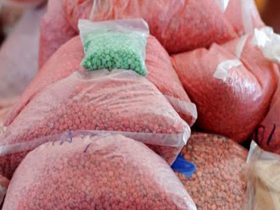The government is going to initiate mobile courts to curb various forms of drug abuse, according to sources at the Home Ministry.
The ministry is expecting to finalise the draft Narcotics Control (Amendment) Act 2013 very soon in a bid to introduce stricter control over the growing menace, they added.
Once the amended law is passed, the trials of small-scale crimes relating to drug abuse can be handled through mobile courts on the spot, with the additional benefit of reducing the backlog of drugs-related cases in the court system.
Sources at the Department of Narcotic Control (DNC) said the proposed law contains provisions for 35 categories of punishment.
Earlier, courts used to sentence a person 2-10 years’ jail term if found guilty of possessing 25 kg heroin. Once the proposed law comes into effect, the person will have to face either a life term or even capital punishment for the same crime.
The mobile courts will be able to hand down punishment for drug-related crimes in three categories. They will be empowered to hold trial for any amount of drugs.
Asked about the present status of the proposed law, Akhtarruzzaman M Mostafa Kamal, director (administration) of DNC, said Narcotics Control Act (Amended) is awaiting cabinet approval. “It’ll be placed in parliament upon the cabinet approval to it.”
If the proposed law is passed, he said, the trials of drugs-related crimes could be held instantly and the backlog of such cases pending with different courts will ease gradually.
After the amendments, people involved in narcotic cultivation, production, and complicity in drug trade will face punishment, he added.
According to the DNC sources, some new narcotics, including morphine, have been enlisted in the proposed law.
The proposed law speaks about forming separate narcotic courts in every district to deal with drug-related crimes.
Officials concerned said every year 40,000-50,000 cases are filed in connection with drugs or related matters, and stressed the importance of setting up mobile courts authorised to deal with narcotics, to dispose of the cases fast.
Abu Tayeb, additional director of DNC Dhaka Branch, said anti-drug activity including capacity and power of mobile courts will be ‘amplified’ with the enactment of the law.
He said teenagers — both male and female — are now taking various drugs like Shisha and Yaba in various ways, including injections, hampering social relations and harming themselves in the process.
The proposed law is likely to play a crucial role in controlling the trend.
Sources said narcotic officials filed 10,111 cases against 10,990 people in 2013 and added that 40,000-50,000 such cases are still pending with different courts.
On average, 1000-1500 cases are disposed of in a year and the accused getting out of jail through obtaining bails.
The DNC officials also noted that the new law will empower the authorities to confiscate the wealth amassed through drug trade. They said information about wealth of illegal drug traders, including their photos, are being collected.
Referring to drug smuggling into the country, they said the stimulant Yaba is smuggled into the country from Myanmar through Teknaf border. A database of the people who have amassed massive wealth within a short time in the area through which smuggling takes place is being prepared, officials said.
Legal action will be taken against them through the Anti-Corruption Commission, the DNC officials further said.
State Minister for Home Asaduzzman Khan Kamal said apart from narcotic officials’ efforts, other law enforcement agencies are conducting drives to put an end to the illegal drug trade. The law enforcers will take even more stringent steps to curb the drug menace, if needed, he added.
Source: UNBConnect










